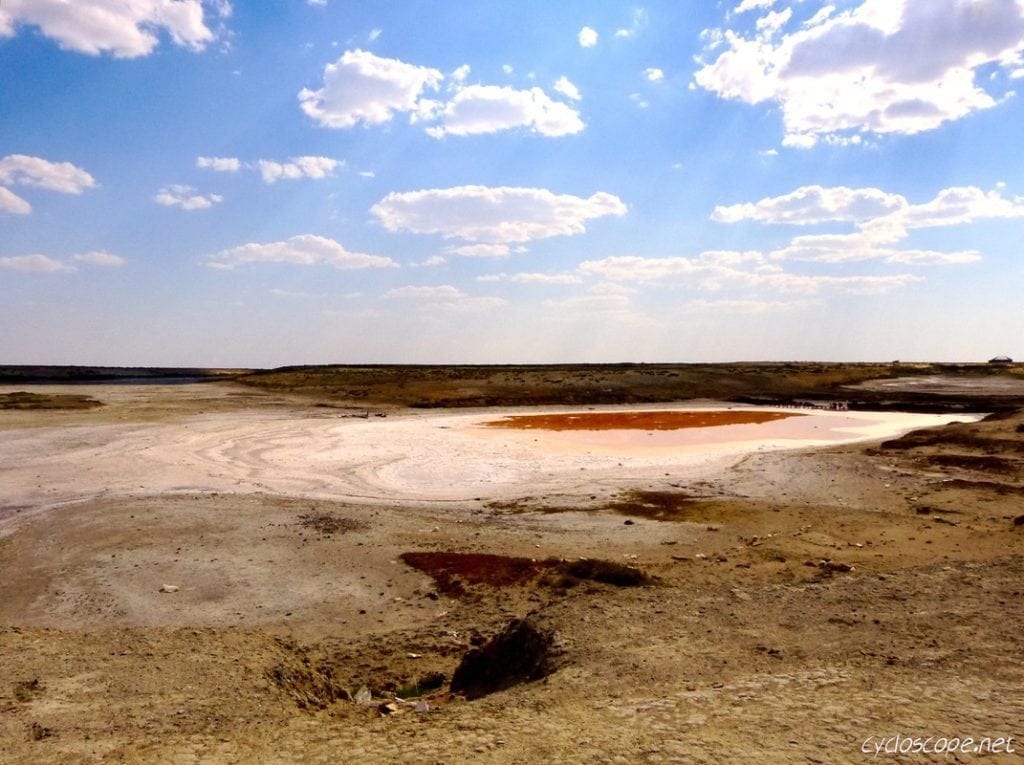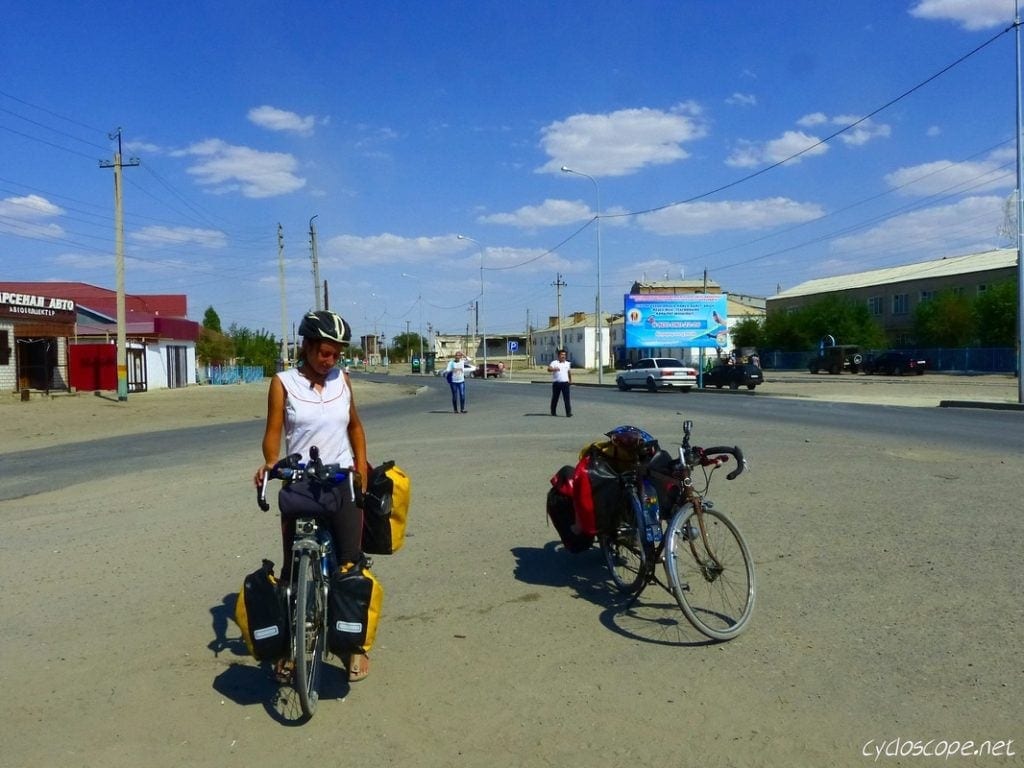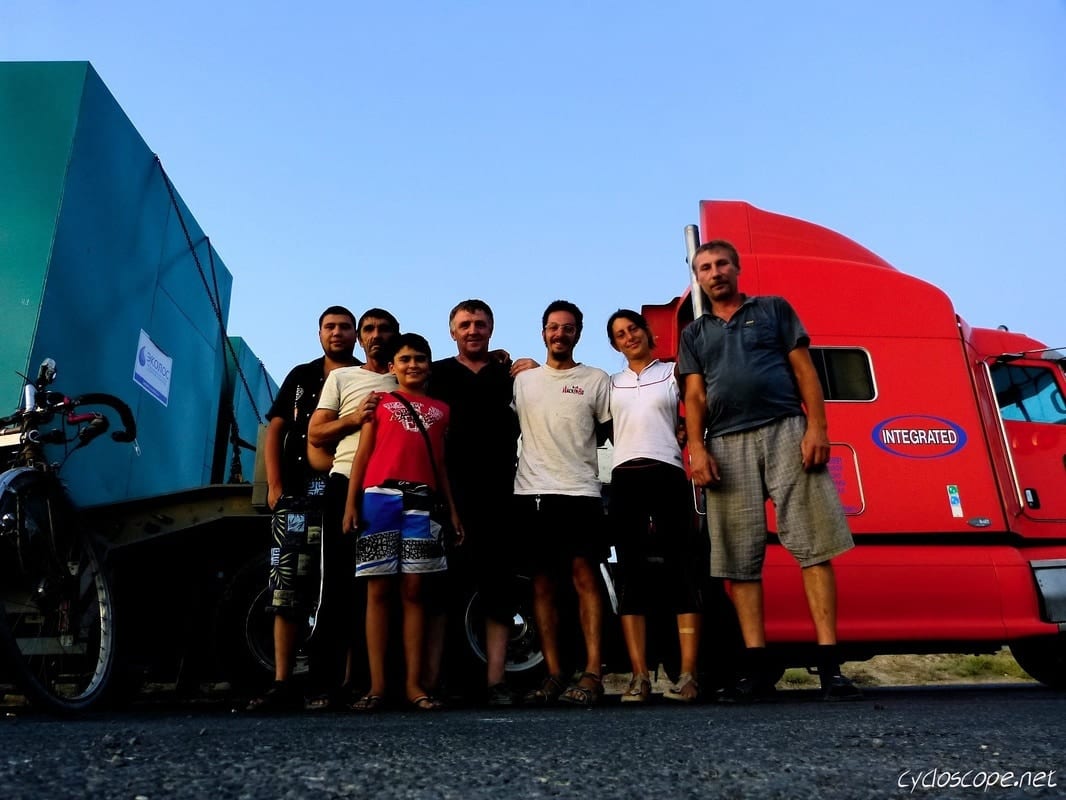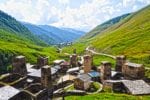Last Updated on 22 January 2025 by Cycloscope

What Used to Be a Major Port on the Aral Sea is Now an almost Ghost Town in a Deadly Desert
We hitchhiked to reach this eerie place. What started as a bicycle tour across Central Asia became a frantic race through Kazakhstan after our Uzbek visa was denied by a drunken consul in Azerbaijan. The ferry dropped us in Aktau, a remote city on the Caspian Sea. From there, we had just 15 days to cross the vast Kazakh steppes and reach Kyrgyzstan.
Initially, we envisioned leisurely cycling through Kazakhstan. Instead, we’ve embraced hitchhiking as our only option to make up for lost time. Despite the challenges, one goal remained: visiting Aralsk, once the most significant port on the shores of the Aral Sea—an area now infamous for an ecological catastrophe.
The Journey to Aralsk
In the sweltering heat of 52°C, we arrived in Aktobe, arguably the nicest Kazakh city we’d seen so far, with its colorful wooden houses and tree-lined streets. Outside the city, the landscape reverted to its endless monotony: barren, yellowish, dry steppe.
We stuck out our thumbs to hitchhike and quickly found a ride—hitchhiking in Kazakhstan feels like a reliable public transport system. A friendly Russian-Kazakh driver offered to take us directly to Aralsk. Along the way, he insisted on treating us to lunch and made arrangements for us to stay in a roadside workers’ camp.
The camp, set up for laborers building new roads, was a series of prefabricated structures. We were warmly welcomed, offered a room for free, and invited to dinner. The workers had prepared boiled eggs for me as a vegetarian and vodka—lots of vodka. It’s worth noting that Kazakh truck drivers strictly avoid alcohol while driving, but when parked for the night, the party begins. By the end of the night, we were drunk and joyful, reminded of the kindness of strangers.
Aralsk: A Port City Lost in the Desert
We awoke with pounding hangovers and cycled the last 15 km to Aralsk. Once the most important port on the Aral Sea, Aralsk is now a desolate town in the middle of a desert. The lake, which once stretched to the city’s shores, has receded more than 70 km away, leaving behind a vast, roadless expanse of sand.
Why Did the Aral Sea Disappear?

The Aral Sea’s demise began in the 1940s when the Soviet Union diverted its two main tributaries, the Amu Darya and Syr Darya, to irrigate surrounding deserts for crops like cotton and rice. Poorly constructed canals resulted in massive water loss through leakage and evaporation.
By the 1960s, up to 60 cubic kilometers of water per year were being siphoned off, causing the sea to shrink. From 1961 to 1970, the water level fell by 20 cm annually. By the 1980s, it was dropping 80–90 cm per year. By 2007, the Aral Sea had lost 90% of its original volume, becoming one of the world’s worst environmental disasters.
Why Aral Sea dry out
In the 1940s, the Soviet government decided to divert Aral Sea’s main tributary rivers, Amu Darya and Syr Darya, in order to irrigate the desert region surrounding it, in an attempt to grow rice, cereals and cotton.
Many of the canals were poorly built, allowing water to leak or evaporate. From the Qaraqum Canal, the largest in Central Asia, perhaps 30 to 75% of the water went to waste. Today, only 12% of Uzbekistan’s irrigation canal length is waterproofed (Wikipedia)
By 1960, between 20 and 60 cubic kilometres of water were going each year to the land instead that into the Aral. With most of its water supply gone, the Aral Sea began to shrink.
From 1961 to 1970, the Aral’s sea level fell at an average of 20 cm a year; in the 1970s, the average rate nearly tripled to 50–60 centimetres per year, and by the 1980s it continued to drop, now with a mean of 80–90 centimetres each year.
By 2007, the Aral sea had declined to 10% of its original size.
Exploring Aralsk
Aralsk’s abandoned port still features rusting cranes and shipwrecks—haunting remnants of a thriving maritime economy. A photo of former Kazakh president Nursultan Nazarbayev holding a fish hangs at the harbor, promoting a questionable restoration project for the Aral Sea. The city itself is bleak, with many abandoned homes. The toxic dust from chemicals dumped into the dried seabed now blows across the steppe, causing one of the highest throat cancer rates in the world.
Reaching the new shore of the Aral Sea is nearly impossible without a four-wheel-drive vehicle, which costs upwards of $300 per person. With no affordable way to reach the water, we explored the crumbling harbor and reflected on the tragedy of the lake’s disappearance.
The Silk Road Reimagined: Hitchhiking to Turkestan

We left Aralsk at 6 p.m., hitching a ride with a convoy of three Russian trucks bound for Uzbekistan. The lead truck, where I rode, was driven by a father accompanied by his 10-year-old son, who spent summers traveling with him.
The landscape remained desolate—just an endless desert. We stopped at a mirage-like pond for a swim, laughing and splashing in the cool water. At night, we dined on fried eggs, a staple meal in Kazakhstan, and celebrated the driver’s birthday with yet another round of vodka.
The next morning, the caravan continued, but frequent police stops required drivers to pay bribes of 2,500 tenge each time. After a long journey, the convoy turned onto an unpaved desert track toward Uzbekistan, leaving us to camp under the vast Kazakh sky.
Despite its hardships, this journey revealed glimpses of humanity’s resilience and generosity—even in one of the most unforgiving landscapes on Earth.
Follow us while we get lost


